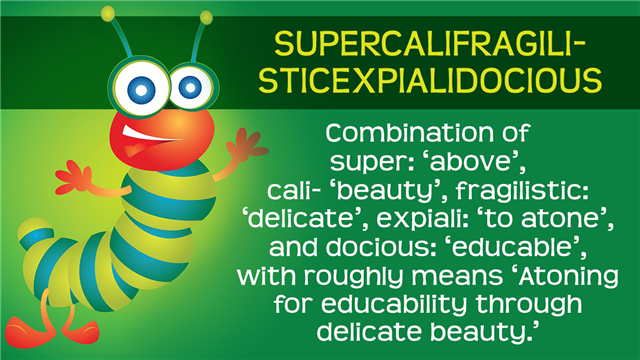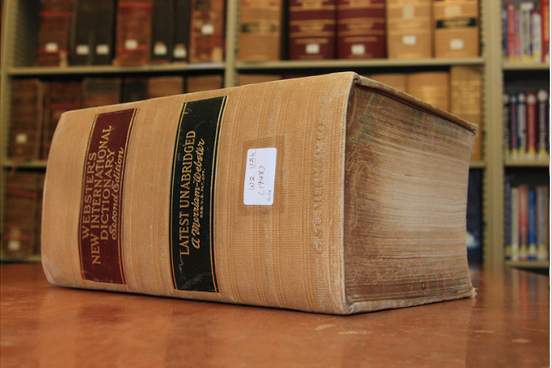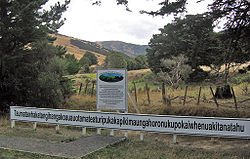For the long time, lexicographers have been debating about the legitimacy of certain words as possible entrants to the English dictionary. For me, the longer the word and the more the number of syllables in it, the more interesting it becomes. Find out some of the most exquisitely coined words in the English language from this article.
Longest word
Methionylthreonylthreonylglutaminylarginyl […] isoleucine
Here’s the deal: the world’s longest English word has exactly 189,819 letters in it and it takes 3 hours and 33 minutes to pronounce it completely!
Wondering what commands such an enormous (literally) honor? Well, it is the chemical name of the world’s largest known protein called titin or connectin. It is made up of 244 individually folded protein domains which in turn are connected by unstructured peptide sequences (largest known polypeptide containing 34,350 amino acids in the human body). Fascinating as the name of this wonder is, there exists some debate as to whether this technical term can actually be considered a word. But even then, mesmerizing it is, isn’t it? And guess what? Here in this article, you will actually get to see this ginormous word if you read on.
But even otherwise, the English language is a huge storehouse of long words that I find rather satisfying to pronounce. They are grand tongue twisters that make perfect sense. Two of my favorite words for the longest time have been inconsequential and quintessentially. I am psychologically satiated to the hilt every time I utter them and utter them a lot I do. But there are other words that are very rarely used and even more rarely heard of. Let’s check some of them out below. If you love the language and lap up trivia like there’s no tomorrow, this is a train ride you should definitely not miss.
A

1. Ablutophobia: Fear of washing or having a bath
2. Absorbefacient: Inducing or boosting absorption
3. Adiathermancy: Impervious to radiant heat or infrared radiation or unaffected by heat waves
4. Agglutination: The construction of words from component morphemes that retain their form and meaning in spite of the blending
5. Arachibutyrophobia: One having fear about peanut butter sticking to the mouth roof
6. Aurantiaceous: Appertaining to oranges or orange trees
7. Automatonophobia: One having fear about dummies, animatronic creatures, statues of wax
8. Autothaumaturgist: A person who exudes an air of mystery around himself consciously; someone pretending to be an enigma
9. Autotonsorialist: A person who cuts his own hair
10. Automysophobia: Fear of getting dirty
B

1. Ballistocardiograph: An instrument which is used to detect body movements caused by heartbeats
2. Bathythermograph: An instrument that is used for recording water temperature as compared to depth
3. Batrachomyomachy: A military engagement between frogs and mice
4. Batrachophagous: A person who eats frogs
5. Bicrescentic: Having the structure of a double crescent
6. Blandiloquence: A flattery or complimentary speech
7. Brachydactylous: Having abnormally short and blunt fingers and toes
8. Brobdingnagian: Colossal
9. Bouleversement: An overturning; ruination
10. Boustrophedon: An ancient method of writing in which one line is written from left to right and the next from right to left and so on.
C

1. Cacodemomania: Pathological belief of one being inhabited by an evil spirit
2. Caesaropapism: Secular ruler having control of the church
3. Catapedamania: Obsession with jumping from high places
4. Cephalonomancy: A kind of divination formerly practiced to detect guilt in a convict by boiling the skull of an ass and checking for any cracking of the skull or movement of the lower jaw
5. Ceruminiferous: Carrying or yielding earwax
6. Chaetophorous: Setigerous or bristle-bearing
7. Cheiloproclitic: One who is attracted to lips
8. Cholangiocholecystocholedochectomy: Process of surgically removing the hepatic duct and gallbladder
9. Chronosynchronicity: Presenting a person’s life in all the stages through a single piece of art
10. Cycloganoidei: Ganoid fish with cycloid scales
D

1. Dactylopterous: A state where the inferior rays of the pectoral fins are entirely or partially detached from the body
2. Defecaloesiophobia: Fear of painful defecation
3. Dendrochronology: Study of tree rings
4. Deorsumversion: Turning downwards
5. Dermatoglyphics: Study of fingerprints and skin patterns
6. Dermatopathophobia: Fear of dermal ailments
7. Didaskaleinophobia: Fear of going to school
8. Dishabiliophobia: Fear of undressing in front of another person
9. Dolichocephalic: Long-headed
10. Dysmorphophobia: Having the fear of physical deformities
E

1. Ecclesiasticus: An Apocryphal book
2. Edriophthalmous: Concerning the Edriophthalma
3. Electroencephalograph: An instrument for measuring the brain’s electrical impulses
4. Electrodynamometer: An instrument for measuring electric current
5. Eleutherophobia: Fear of freedom
6. Epiphenomenalism: Doctrine that mental processes are epiphenomena of brain activity
7. Ephemeromorph: Form of life that is neither animal nor plant
8. Epistaxiophobia: Fear of epistaxises or bleeding noses
9. Ethnomethodology: The study of sociological codes and conventions that underlie everyday social communication and interactions
10. Extemporaneousness: Lack of foresight
F

1. Febrifacient: That which renders feverish
2. Ferriprussiate: A ferricyanate; a ferricyanide
3. Flagelliferous: Bearing a whip or flagellum
4. Flibbertigibbet: Gossipy person, usually referring to a young woman
5. Fibriophobia: Having fear of fever
6. Fibrochondrosteal: Partly fibrous, partly cartilaginous, and partly bony or osseous
7. Fissigemmation: A process of reproduction that intercedes fission and gemmation
8. Forisfamiliation: The act of liberating oneself from parental authority
9. Frankalmoigne: Tenure by free alms
10. Frumentaceous: Resembling wheat or other grain
G

1. Galactodensimeter: Instrument used to measure the density of milk
2. Gastroduodenitis: Swelling of the stomach and duodenum
3. Gastrohysterotomy: Cæsarean section
4. Generalissimo: The Chief Commander of an army
5. Gephydrophobia: Fear of crossing bridges
6. Germanophilia: Love or fondness for Germany or for the Germans
7. Gluconeogenesis: Production of glucose from non-carbohydrates
8. Graminivorous: Feeding on grass or cereals
9. Grammaticaster: A piddling grammarian
10. Gynotikolobomassophile: One nibbling a woman’s earlobes
H

1. Haematogenesis: Production of blood
2. Haematodynamometer: An instrument to measure arterial or venous blood pressure
3. Haussmannize: To rebuild
4. Hellenologophobia: Fear of Greek terms or complex scientific nomenclature
5. Helioseismology: Study of wave oscillations in the sun
6. Hexakosioihexekontahexaphobia: Fear of the number six hundred sixty-six
7. Honorificabilitudinitatibus: One bearing honorableness
8. Honorificabilitudinity: Honorableness
9. Hydrometeorology: Study of atmospheric moisture
10. Hypercatalectic: Having an extra syllable at the end of a verse
I

1. Iatromathematics: Archaic practice of medicine in conjunction with astrology
2. Ichthyophagous: Fish-eating
3. Ichthyophthalmite: A hydrous silicate of calcium and potassium relating to zeolites
4. Immarcescible: Not perishable
5. Immunopathology: Study of immunity to disease
6. Incircumscriptible: Incapable of being restricted
7. Incomprehensibleness: Impossible to know or fathom
8. Interramification: Intertwining of branches
9. Interstratification: Alternative layering of two or more types of clay minerals
10. Ithyphallophobia: Fear of aroused male genitalia
J

1. Jaculiferous: Bearing arrow-like thorns
2. Japanophilia: Love or admiration for Japan or the Japanese
3. Japanophobia: Fear of Japanese
4. Johannisberger: A fine white wine produced on the estate of Schloss Johannisberg, on the river Rhine
5. Jouissance: Merriment
6. Judeophobia: Fear of Jewish people
7. Juglandaceous: Liking or pertaining to walnuts
8. Jungermanniaceae: A genus of hepatic mosses
9. Jurisprudential: Pertaining to the science of juridical law
10. Juxtaposition: The act of positioning two or more things adjacent to each other
K

1. Kakorrhaphiophobia: Fear of failure
2. Katagelophobia: Fear of ridicule
3. Katathermometer: Instrument used to measure the cooling power of air
4. Katsaridaphobia: Fear of cockroaches
5. Kephalonomancy: Divination using a baked head of an ass or a goat
6. Keraunophobia (or Ceraunophobia): Fear of lightning and thunder
7. Kinetheodolite: Type of theodolite used to track missiles and satellites
8. Knickerbockers: Loose breeches ending above the knee
9. Knickknackatory: A collection of baubles and trifles
10. Kosmikophobia: Fear of cosmic phenomenon
L

1. Lamellibranchiata: Class of gastropods with bivalve shells
2. Laryngotracheotomy: Surgery involving cutting into the larynx and the upper part of the trachea
3. Latitudinarianism: Doctrine of broad liberality in religious belief or conduct
4. Lautenclavicymbel: Lute harpsichord with gut strings instead of metal
5. Lautverschiebung: The regular alterations undergone by the primitive Indo-European stops or mute consonants in the Teutonic languages since third century BC
6. Lepidopterology: Study about butterflies and moths
7. Leucocytogenesis: Formation of leukocytes
8. Lexicographical: Pertaining to the art of making a dictionary or lexicon
9. Libanophorous: Producing incense
10. Logizomechanophobia: Fear of computers
M

1. Machiavellianism: The doctrines of Niccolò Machiavelli as written in his book Il Principe (“The Prince”) wherein political expediency is exalted above morality and the use of cunning and deceit in statecraft to maintain authority or to effectuate policy is commended
2. Macrocephalous: Having a large head
3. Margaritomancy: Divination using pearls
4. Maschalephidrosis: Excessive sweating of the armpits
5. Mechanotherapist: A practitioner who medically treats by employing mechanical practices, such as massaging
6. Medomalacuphobia: Fear of losing an erection
7. Metathesiophobia: Fear of changes
8. Microminiaturization: Construction of something on a scale which is smaller than miniature
9. Micropalaeontology: Study of microscopic fossils
10. Monopathophobia: Fear of definite disease
N

1. Necessitarianism: Philosophical theory according to which actions are always consequent to antecedent causes
2. Nemathelminthes: Roundworms
3. Neopharmaphobia: Fear of new drugs
4. Nephelodometer: An instrument for estimating the distances or speed of clouds
5. Neurophysiological: Pertaining to the branch of physiology that deals with the functions of the nervous system
6. Nigroglobulate: The act of excluding someone by a negative vote or veto
7. Noctambulation: Sleepwalking
8. Nucamentaceous: Resembling a nut either structurally or their property of indehiscence; bearing one-seeded nut-like fruits
9. Nucleomituphobia: Fear of nuclear weapons
10. Nyctohylophobia: Fear of dark wooded areas at night
O

1. Obeliscolychny: Lighthouse
2. Obsequiousness: Abject submissiveness
3. Omphalopsychite: One who meditates by stares fixedly at his navel
4. Oneirogmophobia: Fear of wet dreams
5. Ophthalmophobia: Fear of being stared at
6. Ophthalmoscope: Instrument for viewing the interior of the eye
7. Opisthobranchiata: Marine gastropod mollusks with no operculum and gills present posterior to the heart
8. Orphanotrophism: Care and support of orphans
9. Ostraconophobia: Fear of shellfish
10. Otorhinolaryngology: It is a study of ear, nose, and throat
P

1. Palaeoanthropology: The study of early humans
2. Paleophytologist: One versed in the recovery and identification of plant fossils from geological contexts
3. Paraskavedekatriaphobia: Fear of Friday the 13th
4. Penecontemporaneous: Of geological processes occurring immediately after deposition
5. Philoprogenitiveness: The love of offspring
6. Pleuroperipneumony: Inflammation of the pleura and lungs
7. Pneumatophilosophy: Philosophy of spirits or the spirit world
8. Podobromhidrosis: Smelly feet
9. Pseudoantidisestablishmentarianism: Falsely supporting the idea of disestablishment
10. Pteromerhanophobia: Fear of flying
Q

1. Quadragesimarian: One who observes Lent
2. Quadrigeminous: Four-fold
3. Quadrigenarious: Four hundred
4. Quasquicentennial: One hundred twenty-fifth anniversary
5. Quatrefeuille: An ornamental foliation having four foils
6. Quindecemvirate: The body or office of the fifteen sacerdotal college men bestowed with the primary duty of protecting the Sibylline books
7. Quinquagenarian: Person between the ages of 50 and 59
8. Quinquedentated: Five-toothed
9. Quoddamodotative: Existing in a certain manner
10. Quomodocunquize: Making money in any possible way
R

1. Radappertization: Treatment of food with ionizing radiation to kill bacteria
2. Radiometeorograph: An instrument for measuring atmospheric conditions at high altitude
3. Rambunctiousness: The state of being boisterous and disorderly
4. Ranidaphobia: Fear of frogs
5. Representationalism: Doctrine that ideas rather than external objects are basis of knowledge
6. Retrovaccination: The inoculation of a cow with human vaccination in which smallpox virus from human vesicles is used as seed virus in producing smallpox vaccine in cattle
7. Rhabdophobia: Fear of being severely punished or beaten by a rod, or of being severely criticized
8. Rhinotillexomania: Compulsive nose picking
9. Rodomontadist: A person who boasts
10. Roentgenometrics: A chiropractic technique involving the study of X-rays by biomechanical analysis and measurement
S

1. Sacramentarianism: Belief that sacraments have unusual properties
2. Scrophulariaceous: Pertaining to the figwort family of plants (Scrophulariaceae)
3. Secundogeniture: The right of inheritance belonging to the second-oldest child
4. Sesquicentennially: Every 150 years
5. Siderodromophobia: Fear of trains, railroads or train travel
6. Spasmenagaliaphobia: Fear of shattered glass
7. Spermatophobia: The fear of germs
8. Spectroheliokinematograph: Camera for taking pictures of the sun
9. Sphygmomanometer: An instrument for measuring arterial blood pressure
10. Steganophthalmata: A division of jellyfishes, including most of the large disklike species
T

1. Trinitrophenylmethylnitramine: A type of explosive
2. Tetrakishexahedron: A solid in the isometric system, bounded by 24 congruent isosceles-triangular faces, four corresponding to each face of the cube
3. Thanatognomonic: Indicating death
4. Theologicophobia: Fear of theology
5. Theophilanthropism: Having love for divinity as well as mankind
6. Thermoluminescence: A form of luminescence that is exhibited by certain crystalline materials that may have absorbed energy previously
7. Transmogrification: Transformation to a different form or shape, especially strange or grotesque
8. Trichopathophobia: Fear of hair
9. Triskaidekaphobia: Phobia of the number 13
10. Triboluminescence: Frictional emission of light
U

1. Ubiquitarianism: Belief in the omnipresence of God
2. Ultramicroscope: Instrument for viewing objects that are difficult to see by the naked eye
3. Ultimogeniture: The right of inheritance belonging to the last son
4. Umbraculiform: Umbrella-shaped
5. Uncircumstandtial: Not circumstantial; trivial
6. Uncompartmentalized: Not separated into different categories or compartments
7. Unconsentaneous: Disagreement
8. Uniformitarianism: The theory or assumption that the same natural laws and processes that operate in the universe now, have operated since its inception and apply everywhere in the universe and that all geological phenomena may be explained as the result of these existing forces
9. Unsoutcheoned: Destitute of an escutcheon
10. Utilitarianism: Adopting a code of conduct that determines ethical values
V

1. Valetudinarianism: The condition or state of mind of a sickly or weak person who is incessantly worried about personal health
2. Vasoconstriction: Narrowing of the blood vessels owing to the contraction of their muscular walls
3. Venturesomeness: Daring and adventurous
4. Venustraphobia: Being scared of beautiful women
5. Verminophobia: Being afraid of germs
6. Vernacularization: The act, process, or state of picking elements from a foreign language and modifying and accepting it as a part of a native dialect of a specific population
7. Virginitiphobia: Fear of rape
8. Vitricophobic: One who fears his step-father
9. Volumenometer: Instrument that determines volume of a solid
10. Voicespondence: Correspondence by means of formerly recorded conversations
W

1. Walloonphobia: Fear of Walloons (French-speaking Belgian community)
2. Wawaskeesh: An American elk
3. welterweight: A combat sports weight class division
4. Weatherometer: Instrument for measuring weather-resisting properties of paint
5. Weatherstripping: Material to seal the openings such as doors, trunks, windows to exclude the cold, wind, and rain
6. Weltanschauungen: One’s individual or a group’s outlook towards life
7. Whereinsoever: In whatever matter, respect, place, or action
8. Whippersnappers: People considered insignificant and pretentious
9. Whippoorwill: Night-jar from America
10. Whithersoever: Wherever
X

1. Xanthocyanopsy: Kind of color-blindness in which one can see only blue and yellow colors
2. Xanthomelanous: Pertaining to races with black hair and yellow or olive complexion
3. Xanthophobia: Fearful towards yellow color
4. Xanthospermous: Containing yellow seeds
5. Xenodocheionology: Liking for hotels and inns
6. Xenoglossophobia: Fear of foreign languages
7. Xerophthalmia: Dry eye syndrome
8. Xeroradiography: Kind of X-ray wherein the picture is taken on a paper and not on a film
9. Xiphophyllous: Sword-shaped leaved
10. Xylopyrographist: A poker painter
Y

1. Yachtsmanship: Adeptness in sailing a yacht
2. Yarborough: Hand of cards where no card is above nine
3. Yarnwindle: Tool used for winding the yarn
4. Yellowhammer: A passerine bird in the bunting family Emberizidae
5. Yellowshanks: American shorebirds of the sandpiper family
6. Yellowthroats: A New World warblers in the genus Geothlypis
7. Yeomanette: Old term for a woman serving in the American naval reserve during World War II
8. Yezdegerdian: Pertaining to Yezdegerd, the last Sassanian monarch of Persia, overthrown by the Muslims
9. Yogibogeybox: Things used by a spiritualist
10. Yttriferous: One that contains yttrium
Z

1. Zemmiphobia: Being afraid of the great mole rat
2. Zalambdodont: Having molar teeth with V-shaped ridges
3. Zarathustrianism: Zoroastrianism
4. Zeusophobia: Being scared of divine beings
5. Zigzaggery: Contortion
6. Zoanthodeme: Collective zooids of compound anthozoa
7. Zooarchaeology: Studying the remnants of animals on archaeological sites
8. Zoosporangium: A spore
9. Zeugmatography: A term previously proposed for magnetic resonance imaging (MRI)
10. Zeugobranchiata: A division of marine mollusks with gills on both sides of the body and paired renal organs
Now, here are some other fun words that are bound to wriggle those gray cells optimally. Most of them aren’t a part of any lexicon yet, but that doesn’t make them any less mesmerizing.
Here are the top 5 names of places on the globe with the longest names.
Taumatawhakatangihangakoauauotamateaturipukakapikimaungahoronukupokaiwhenuakitanatahu (85 letters) – A hill in New Zealand, the name of which stands for: “The summit of the hill, where Tamatea, who is known as the land eater, slid down, climbed up and swallowed mountains, played on his nose flute to his loved one”.
Gorsafawddachaidraigodanheddogleddolonpenrhynareurdraethceredigion (66 letters) – A town in Wales, the name of which means: “The Mawddach station and its dragon teeth at the Northern Penrhyn Road on the golden beach of Cardigan bay”.
Llanfairpwllgwyngyllgogerychwyrndrobwllllantysiliogogogoch (58 letters) – A northern Welsh town the name of which means: “The church of St. Mary in the hollow of white hazel trees near the rapid whirlpool by St. Tysilio’s of the red cave”.
Chargoggagoggmanchauggagoggchaubunagungamaugg (41 letters) – A lake in Massachusetts.
Nunathloogagamiutbingoi (23 letters) – The name of certain Alaskan dunes.
And here are two mind-boggling scientific terms for your pleasure.
Methionylglutaminylarginyltyrosylglutamylserylleucylphenylalanylalanylglutaminylleucyllysylglutamylarginyllysylglutamylglycylalanylphenylalanylvalylprolylphenylalanylvalylthreonylleucylglycylaspartylprolylglycylisoleucylglutamylglutaminylserylleucyllysylisoleucylaspartylthreonylleucylisoleucylglutamylalanylglycylalanylaspartylalanylleucylglutamylleucylglycylisoleucylprolylphenylalanylserylaspartylprolylleucylalanylaspartylglycylprolylthreonylisoleucylglutaminylasparaginylalanylthreonylleucylarginylalanylphenylalanylalanylalanylglycylvalylthreonylprolylalanylglutaminylcysteinylphenylalanylglutamylmethionylleucylalanylleucylisoleucylarginylglutaminyllysylhistidylprolylthreonylisoleucylprolylisoleucylglycylleucylleucylmethionyltyrosylalanylasparaginylleucylvalylphenylalanylasparaginyllysylglycylisoleucylaspartylglutamylphenylalanyltyrosylalanylglutaminylcysteinylglutamyllysylvalylglycylvalylaspartylserylvalylleucylvalylalanylaspartylvalylprolylvalylglutaminylglutamylserylalanylprolylphenylalanylarginylglutaminylalanylalanylleucylarginylhistidylasparaginylvalylalanylprolylisoleucylphenylalanylisoleucylcysteinylprolylprolylaspartylalanylaspartylaspartylaspartylleucylleucylarginylglutaminylisoleucylalanylseryltyrosylglycylarginylglycyltyrosylthreonyltyrosylleucylleucylserylarginylalanylglycylvalylthreonylglycylalanylglutamylasparaginylarginylalanylalanylleucylprolylleucylasparaginylhistidylleucylvalylalanyllysylleucyllysylglutamyltyrosylasparaginylalanylalanylprolylprolylleucylglutaminylglycylphenylalanylglycylisoleucylserylalanylprolylaspartylglutaminylvalyllysylalanylalanylisoleucylaspartylalanylglycylalanylalanylglycylalanylisoleucylserylglycylserylalanylisoleucylvalyllysylisoleucylisoleucylglutamylglutaminylhistidylasparaginylisoleucylglutamylprolylglutamyllysylmethionylleucylalanylalanylleucyllysylvalylphenylalanylvalylglutaminylprolylmethionyllysylalanylalanylthreonylarginylserine – At 1,913 characters, this is the full name of tryptophan synthetase – a protein which consists of 267 amino acids.
Acetylseryltyrosylserylisoleucylthreonylserylprolylserylglutaminylphenylalanylvalylphenylalanylleucylserylserylvalyltryptophylalanylaspartylprolylisoleucylglutamylleucylleucylasparaginylvalylcysteinylthreonylserylserylleucylglycylasparaginylglutaminylphenylalanylglutaminylthreonylglutaminylglutaminylalanylarginylthreonylthreonylglutaminylvalylglutaminylglutaminylphenylalanylserylglutaminylvalyltryptophyllysylprolylphenylalanylprolylglutaminylserylthreonylvalylarginylphenylalanylprolylglycylaspartylvalyltyrosyllysylvalyltyrosylarginyltyrosylasparaginylalanylvalylleucylaspartylprolylleucylisoleucylthreonylalanylleucylleucylglycylthreonylphenylalanylaspartylthreonylarginylasparaginylarginylisoleucylisoleucylglutamylvalylglutamylasparaginylglutaminylglutaminylserylprolylthreonylthreonylalanylglutamylthreonylleucylaspartylalanylthreonylarginylarginylvalylaspartylaspartylalanylthreonylvalylalanylisoleucylarginylserylalanylasparaginylisoleucylasparaginylleucylvalylasparaginylglutamylleucylvalylarginylglycylthreonylglycylleucyltyrosylasparaginylglutaminylasparaginylthreonylphenylalanylglutamylserylmethionylserylglycylleucylvalyltryptophylthreonylserylalanylprolylalanylserine – With 1,185 letters, this is the chemical name of the Coat Protein, Tobacco Mosaic Virus (TMV), Dahlemense Strain and was first published in American Chemical Society’s “Chemical Abstracts Service”.
And now for the monarch of all words – 189,819 characters long!
Chemical Name of Titin
Whew!! Wasn’t that some real heavy stuff! Well that’s it for now. Guess you too are short of breath after reading the long list. Hope you had fun reading them though!
The Longest Words in English
Most English words longer than about 15-20 letters are scientific, meaningless, or highly specialized, and they tend to be formed by affixation. This is the act or process of adding affixes to a base word to produce a derivative word—in the word affixation, for instance, -ation is an affix. Here are some of the longest words.
The longest word entered in most standard English dictionaries is Pneumonoultramicroscopicsilicovolcanoconiosis with 45 letters. Our definition is «a lung disease caused by inhalation of very fine silicate or quartz dust.» The entry for this word can be found in our Medical Dictionary.
Yes, that number is correct. The longest string of letters used to describe something isn’t technically a word—it’s the chemical name for a protein, begins with methionylthreonylthreonylglutaminyl…, and continues for quite a while after that. The name has 189,819 letters, fills more than 50 pages, and takes more than three hours to say. If you’ve got three hours to blow, you can listen to it said here.
28, 29, and 34 Letters
There are some long words that are rarely or never used in a sentence, but instead are simply used as examples of long words, and for that reason we don’t include them in our dictionaries. The most famous of these are antidisestablishmentarianism, which has 28 letters and supercalifragilisticexpialidocious, which has 34 letters. Floccinaucinihilipilification (29 letters) («the act or habit of assessing something as worthless») is another of this ilk. Our claim is not that these aren’t words, but that they aren’t words that meet our criteria for entry. We explain why here.
The longest place name in the United States is possibly a lake in Massachusetts called Lake Chargoggagoggmanchauggauggagoggchaubunagungamaugg (49 letters, or 53, if you count the Lake portion). It is also sometimes called Webster Lake. While the longer name is based on earlier names for the lake from the language of the Nipmuc people who inhabited the area, this version of the name—along with its reputed translation, «You fish on your side; I fish on my side; nobody fishes in the middle”—appears to have been the invention of a local newspaper editor.
Photo: Hill near Hawkes Bay, NZ
The longest place name in the English-speaking world is thought to be a 1,001-foot-high hill in New Zealand called Taumatawhakatangihangakoauauotamateaturipukakapikimaungahoronukupokaiwhenu-akitanatahu. Similar to the lake mentioned above, this place name also has spelling variations. It comes from the Maori language and has been translated as “the place where Tamatea, the man who had big knees, the climber of mountains, the slider, the land-swallower that traveled about, played the nose flute that he had to the loved ones.” The hill is sometimes called “Taumata” for short.
30 Letters
29 Letters
Methylenedioxymethamphetamine refers to a synthetic amphetamine used illicitly for its mood-enhancing and hallucinogenic properties. You may know this drug by another, shorter, name: ecstasy. Or you may know it by an even shorter name: MDMA. (Fun fact: in the 1970’s psychiatrists used it to «enhance» therapy sessions.)
23, 24, 25, 26, and 27 Letters
22 Letters
Counterrevolutionaries refers to people who participate in a revolution directed toward overthrowing a government or social system established by a previous revolution.
Deinstitutionalization refers to the release of institutionalized individuals from institutional care (as in a psychiatric hospital) to care in the community, and also to the reform or modification of an institution to remove or disguise its institutional character..
Otorhinolaryngological refers to a medical specialty concerned especially with the ear, nose, and throat and related parts of the head and neck.
21 Letters
Incomprehensibilities refers to things that are hard to comprehend or understand. (We’re pretty sure most of these words qualify.)
Pseudohermaphroditism refers to the condition of having the gonads and karyotype of one sex and external genitalia that is of the other sex or is ambiguous.
And finally, psychoneuroimmunology refers to a branch of medicine that deals with the influence of emotional states and nervous system activities on immune function.
(Did you count only 20 words in the list? The 21st is hippopotomonstrosesquippedaliophobia, which is fear of long words. Apologies to anyone who suffers from this condition with its 36-letter name—we’re sure we’ve made it worse.)
Ready to take your Scrabble skills to the next level? This list of the longest words in the English language could score you major points on your next game — if you can remember how to spell them.
Some of the words that qualify for the title take hours to pronounce, like the 189,819-letter word for the protein Titin. Additionally, many of the longest words are medical terms, so we have excluded some of them to allow for more variety. The end result is a list of fascinatingly lengthy words that will make your vocabulary downright sesquipedalian.
Antidisestablishmentarianism
Part of Speech: noun
Definition: opposition to the disestablishment of the Church of England
Origins: While the word originated in 19th century Britain, it is now used to refer to any opposition to a government withdrawing support from a religious organization. Though rarely used in casual conversation, the word was featured in the Duke Ellington song, “You’re Just an Old Antidisestablishmentarianist.”
Floccinaucinihilipilification
Part of Speech: noun
Definition: the act of defining or estimating something as worthless
Origins: This word stems from the combination of four Latin words, all of which signify that something has little value: flocci, nauci, nihili, pilifi. This style of word creation was popular in Britain in the 1700s.
Pneumonoultramicroscopicsilicovolcanoconiosis
Part of Speech: noun
Definition: an invented word said to mean a lung disease caused by inhaling a fine dust
Origins: This word emerged in the late 1930s, and was said to be invented by Everett K. Smith, president of the National Puzzlers’ League, in an imitation of very long medical terms. It is not found in real medical usage.
Pseudopseudohypoparathyroidism
Part of Speech: noun
Definition: an inherited disorder similar to pseudohypoparathyroidism
Origins: This genetic disorder causes “short stature, round face and short hand bones,” according to the National Institutes of Health. Despite having a similar name, it is not the same as pseudohypoparathyroidism.
Psychoneuroendocrinological
Part of Speech: adjective
Definition: of or related to to the branch of science concerned with the relationships between psychology, the nervous system, and the endocrine system
Origins: This term was first seen in the 1970s in Journal of Neurological Science, a medical journal.
Sesquipedalian
Part of Speech: adjective
Definition: having many syllables or characterized by the use of long words
Origins: The Roman poet Horace used this term to caution young poets against relying on words that used a large number of letters. It was adopted in the 17th century by poets to ridicule their peers who used lengthy words.
Hippopotomonstrosesquippedaliophobia
Part of Speech: noun
Definition: fear of long words
Fun Fact: This word is most often used in humorous contexts. It is an extension of the word sesquipedalophobia, which has the same meaning and is more often used in a formal context.
Incomprehensibilities
Part of Speech: noun
Definition: things that are impossible to understand or comprehend
Fun Fact: In the 1990s, this word was named the longest word in common usage.
Uncopyrightable
Part of Speech: adjective
Definition: not able or allowed to be protected by copyright
Fun Fact: This word is one of the longest isograms (a word that does not repeat letters) in the English language.
Dermatoglyphics
Part of Speech: noun
Definition: the scientific study of hands, including fingerprints, lines, mounts, and shapes
Fun Fact: Unlike palmistry, this study is based in science and is often used in criminology as a way to identify both perpetrators and victims.
Euouae
Part of Speech: noun
Definition: a type of cadence in medieval music
Fun Fact: While this word might not look as impressive as others on this list, it’s the longest word in the English language to be composed entirely of vowels. (It’s also the word with the longest string of vowels.)
Psychophysicotherapeutics
Part of Speech: noun
Definition: a therapeutic approach that integrates both the mind and body
Fun Fact: While the Oxford Dictionary does not provide an official definition of this word, it is included on their list of the longest words in the English language.
Otorhinolaryngological
Part of Speech: adjective
Definition: of or relating to the medical specialization involving the ear, nose, and throat
Fun Fact: This medical specialization is more commonly known by its acronym, ENT.
It should come as no surprise that we are word lovers. In fact, we are big word lovers in that we love really big words. To express our love, we looked around for some of the biggest, most ludicrously long words in the English language. In addition to pure length, we also tried to find:
- the longest word without vowels
- the longest one-syllable word
- and other uniquely long words.
Figuring out which word is the longest of them all isn’t as simple as just counting letters, though. Should you count scientific words? Should obscure, rarely used words be included, or should we give the honor to a word people actually use? In the interest of fairness, our list includes scientific words, obscure words, and all of the absurdly long words stuck in between.
methionylthreonylthreonylglutaminylarginyl…
At over 180,000 letters long, the chemical name of the protein titin is often said to technically be the longest English word. If spoken out loud, this word takes over three hours to say! Its absurd length is due to the fact that proteins get their scientific names by combining the names of all of their joined amino acids together, and titin has quite a lot of them. For obvious reasons, titin’s official name has never actually appeared in a dictionary or scientific text. Because it is a scientific term, many would disqualify the Big M from actually taking the crown as English’s longest word.
pneumonoultramicroscopicsilicovolcanoconiosis
Pneumonoultramicroscopicsilicovolcanoconiosis, coming in at 45 letters long, is typically the biggest word you will find that actually appears in an English dictionary. According to many sources, it was coined around 1935 by Everett Smith, who at the time was the president of the National Puzzlers’ League. The word, which was basically engineered for its length, refers to a lung disease caused by inhaling silica dust.
sesquipedalianism
Let’s look at a word related to the business of “longest words.” Sesquipedalianism is the tendency to use long words. Do you have sesquipedalian tendencies? (We do.)
The word is traced to the ancient Roman poet Horace, who in a treatise on the art of poetry wrote that in certain circumstances, poets must avoid sesquipedalia verba, a Latin phrase meaning “words [verba] a foot and a half long [sesquipedalia].” Horace clearly had a sense of humor.
pseudopseudohypoparathyroidism
We include pseudopseudohypoparathyroidism, another medical term, because this is one of the longest words to appear in major dictionaries that wasn’t created with length in mind. Pseudo- is a combining form meaning “false, pretended, unreal.”
You might notice the appearance of pseudo- twice. That’s because this disorder simulates the symptoms of pseudohypoparathyroidism, in which the body doesn’t respond to the parathyroid hormone. So, there are two levels of “faking it” going on here.
English isn’t the only language with lengthy elements of its lexicon. Get to know some of the world’s longest words!
antidisestablishmentarianism
Often, people will bust out antidisestablishmentarianism as the longest word they know and are actually able to say. This word has rarely been used and is only mentioned due to its ridiculous length. This word refers to opposition to withdrawing support from the Anglican Church as the state church of 19th-century England.
supercalifragilisticexpialidocious
Even though the sound if it is something quite atrocious, we do really like the word supercalifragilisticexpialidocious. This nonsensical word with no real meaning was popularized by the 1964 Disney film Mary Poppins and is often used by children as an example of a humorously long word. Songwriters Richard and Robert Sherman take credit for this exact spelling of the word, but the word itself existed even before Mary Poppins made it popular.
floccinaucinihilipilification
Here’s one that is also very meta: floccinaucinihilipilification is a rarely used word that means “the estimation of something as valueless.” It is usually used in reference to itself! Dating back to the 1700s, the word contains four Latin roots that all mean “of little value” or “trifling”: floccī, naucī, nihilī, and pilī.
honorificabilitudinitatibus
The word honorificabilitudinitatibus, which is said to mean “capable of receiving honor,” has two major honors to its name. Firstly, it is the longest word to ever appear in the works of William Shakespeare. Billy the Bard only ever used it once, in his play Love’s Labour’s Lost (1590s). Secondly, honorificabilitudinitatibus is the longest English word wherein the consonants and vowels alternate back and forth. Check it again if you didn’t notice!
uncharacteristically
Uncharacteristically for most of the really long words you’ve seen so far, the word uncharacteristically is often said to be the longest word that the average English speaker will commonly see or actually use in everyday life. As you may already know, uncharacteristically is an adverb that describes something as not being typical or acting in a characteristic manner.
incomprehensibilities
At 21 characters, another one of the longest words you might actually use yourself is incomprehensibilities. We define incomprehensible as “impossible to comprehend or understand,” so incomprehensibilities are “things you can’t comprehend.” ¿Comprendes?
uncopyrightables
If you look closely at the spelling, you’ll notice a peculiar thing about this word with 16 letters. It does not repeat any letter; each character is used only once. This word is sometimes called an isogram among lovers of words and word games.
One of the longest isograms is subdermatoglyphic, at 17 characters. But, since subdermatoglyphic (dermatoglyphics studies the patterns of skin markings on the hands and feet) is a bit scientific and certainly not one that is used often, we’re spotlighting uncopyrightables instead because it’s one we can all remember. It means, of course, “items that are unable to be copyrighted.”
rhythms
The word rhythms may not look like much at only seven letters long, but it is said to be the longest English word without one of the five main vowels in it. The letter Y, that wishy-washy “sometimes vowel,” is filling in while A, E, I, O, and U are taking a break. As we all know, the word rhythms means “movements or procedures with uniform or patterned recurrence of a beat, accent, or the like.”
Are there really words without vowels? Depending on the definition, the answer might elicit a hmm.
strengths
Strengths is another smaller word with a big achievement under its belt. It is the longest English word with only a single vowel in it. Considering it is only eight letters long, that really shows you how much we value our vowels. The plural strengths is most often used to mean “positive or valuable attributes or qualities.”
squirrelled
We go nuts for this word. While the word squirreled usually only has one L in American English, some dictionaries accept this British English version as an alternate spelling. Some Americans pronounce the word squirrelled as a one-syllable word (rhyming with “curled”). This makes squirrelled the longest one-syllable word in the English language at 11 letters. If all of that sounds too squirrely for you, the one-syllable verb broughammed from the noun brougham, a type of carriage, is also 11 letters long.
As an aside, some may tell you that the word schtroumpfed is actually the longest “English” word with only a single syllable. This word has been used in some translations of The Smurfs (which is Les Schtroumpfs in French) in place of the more commonly used nonsensical verb smurfed. In our opinion, claiming schtroumpfed is the longest one-syllable word is just a bunch of smurf.
Aegilops
Aegilops sounds like the name of a mythical monster, but it is actually the name of a genus of wild grasses commonly known as goatgrass. In addition to that, Aegilops is also commonly said to be the longest English word that has all of the letters in alphabetical order.
Indulge your inner sesquipedalian and take the quiz!
Think you’re ready to ace our longest English words quiz? Or is it a long shot? It won’t be long before you find out. Remember that a little practice goes a long way!
The Oxford English Dictionary contains over 170,000 words in current use, but what are the longest words in the English language?
The longest word in English is the chemical name for the titin protein found in humans. It is named after the chemicals which make it up and has 189,819 letters. This would fill pages of this article alone, although it has even been disputed if it forms a real word at all! For this reason, and because dictionaries tend to omit technical names of chemicals, you won’t find it written in this list.
Anyway, before we get side-tracked, we’re here to focus on the longest English words in the dictionary. So, let’s get into it! Here is a list of 11 of the longest words in English:
The 11 longest English words

1. Pneumonoultramicroscopicsilicovolcanoconiosis (45 letters)
The longest English word in the dictionary is Pneumonoultramicroscopicsilicovolcanoconiosis, which is a lung disease caused by the inhalation of very fine silicate or quartz dust.
So, if you were wondering what word is longer than supercalifragilisticexpialidocious, this is your answer!
How is the longest word in the English language pronounced? Play the video below to hear someone saying the longest word!
2. Hippopotomonstrosesquippedaliophobia (36 letters)
The second longest word on our list is Hippopotomonstrosesquippedaliophobia. Hippopotomonstrosesquippedaliophobia is the name for the fear of long words, how ironic! It also happens to be the longest non-medical word in English.
3. Supercalifragilisticexpialidocious (34 letters)
Are you a Mary Poppins fan? If you are then you’ll be very familiar with this very long word with the same first and last letters. And, before you ask how many words does supercalifragilisticexpialidocious have, I can assure you that it is only one!
A fabulously nonsensical word derived from the popular film Mary Poppins, supercalifragilisticexpialidocious means something which is great or extraordinary. It’s…
4. Pseudopseudohypoparathyroidism (30 letters)
Pseudohypoparathyroidism is a genetic disorder associated with resistance to the parathyroid hormone. It is characterized by short stature, a round face, short neck, and shortened bones in the hands and feet.
5. Floccinaucinihilipilification (29 letters)
Floccinaucinihilipilification is the action or habit of describing or estimating something as unimportant or worthless. Easy for you to say…
6. Antidisestablishmentarianism (28 letters)
One that I learnt in history class! Antidisestablishmentarianism is twenty eight letters long and describes a political movement in 19th century England against the disestablishment or removal of the Church of England as the official state church of England, Ireland and Wales. You can still use it today to refer to opposition to the withdrawal of government funding or support for a particular church or religion.
7. Honorificabilitudinitatibus (27 letters)
From the works of Shakespeare, the meaning of honorificabilitudinitatibus is the state of being able to achieve honors or “with honorableness”. It is also in the Guinness World Records for the longest English word consisting strictly of alternating consonants and vowels.
8. Thyroparathyroidectomized (25 letters)
A medical term for the surgical removal of both the thyroid and parathyroid glands.
9. Dichlorodifluoromethane (23 letters)
Dichlorodifluoromethane is a colorless gas and cooling or freezing agent for consumer use, sold under the name Feon-12. The technical definition of dichlorodifluoromethane is a chlorofluoromethane CCl2F2.
https://youtu.be/gUdFmuHT9HA
10. Incomprehensibilities (21 letters)
Incomprehensibilities means impossible or incredibly difficult to comprehend. In the 1990s it set the record as the longest word “in common usage”, which seems almost incomprehensible when you think about it.
11. Sesquipedalianism (17 letters)
Although not the next longest word on the list, we simply had to include it. Sesquipedalianism is the practice of using long words in speech or writing.
An important note
There are some other long words that we could have included in this list of the longest words in English, and you may see some other words in different lists depending upon where you look. However, not all dictionaries will include highly technical, medical words so we have tried to avoid including these in our longest word list.
The longest English word in history?
So, what is the biggest word? Are you still thinking about the longest English word in history? Thought you might be! If you want to know the longest word in English, it’s spelled Methionylalanylthreonyl… You didn’t really think I was going to spell the whole thing out, did you? We’d be here for hours!
If you want to hear how the longest word in English is pronounced, one hero has even made a YouTube video for it. So, settle in for a 1-hour epic and enjoy the longest English word pronunciation you’ll hear in your life!
As a reminder, and if you want to know more about it, it’s the titin protein. This can be found in humans and is essential to the structure, development and elasticity of muscle. Its chemical name is 189,819 letters long.
A young MrBeast even had a go at pronouncing the longest word in English…
The longest conclusion
Don’t worry, I’m not really going to put you through the longest conclusion in the English language after all that!
English has some of the longest words in any language. Some of these words, such as supercalifragilisticexpialidocious, are fun to say. Others can be quite a mouthful. While most of these words aren’t commonly used in day-to-day conversations, they are still interesting to learn about because of their length and complexity.
Were you able to successfully pronounce any of the longest English words? Let us know in the comments!
The English language is full of interesting and complex words and there are loads of amazing facts about English that are worth exploring.
For those of you who are ESL teachers or English language learners, having a go at pronouncing these words can be a great way to bring some fun into the classroom. You can also check out these ESL games for adults for some more classroom fun.
From Wikipedia, the free encyclopedia
The identity of the longest word in English depends on the definition of a word and of length.
Words may be derived naturally from the language’s roots or formed by coinage and construction. Additionally, comparisons are complicated because place names may be considered words, technical terms may be arbitrarily long, and the addition of suffixes and prefixes may extend the length of words to create grammatically correct but unused or novel words.
The length of a word may also be understood in multiple ways. Most commonly, length is based on orthography (conventional spelling rules) and counting the number of written letters. Alternate, but less common, approaches include phonology (the spoken language) and the number of phonemes (sounds).
| Word | Letters | Meaning | Claim | Dispute |
|---|---|---|---|---|
| methionylthreonylthreonylglutaminylalanyl…isoleucine | 189,819 | The chemical composition of titin, the largest known protein | Longest known word overall by magnitudes. Attempts to say the entire word have taken two[1] to three and a half hours.[2] | Technical; not in dictionary; whether this should actually be considered a word is disputed |
| methionylglutaminylarginyltyrosylglutamyl…serine | 1,909 | The chemical name of E. coli TrpA (P0A877) | Longest published word[3] | Technical |
| lopadotemachoselachogaleokranioleipsano…pterygon | 183 | A fictional dish of food | Longest word coined by a major author,[4] the longest word ever to appear in literature[5] | Contrived nonce word; not in dictionary; Ancient Greek transliteration |
| pneumonoultramicroscopicsilicovolcanoconiosis | 45 | The disease silicosis | Longest word in a major dictionary[6] | Contrived coinage to make it the longest word; technical, but only mentioned and never actually used in communication |
| supercalifragilisticexpialidocious | 34 | Unclear in source work, has been cited as a nonsense word | Made popular in the Mary Poppins film and musical[7] | Contrived coinage |
| pseudopseudohypoparathyroidism | 30 | A hereditary medical disorder | Longest non-contrived word in a major dictionary[8] | Technical |
| antidisestablishmentarianism | 28 | The political position of opposing disestablishment | Longest non-contrived and nontechnical word[9] | Not all dictionaries accept it due to lack of usage.[10] |
| honorificabilitudinitatibus | 27 | The state of being able to achieve honors | Longest word in Shakespeare’s works; longest word in the English language featuring alternating consonants and vowels[11] | Latin |
Major dictionaries
The longest word in any of the major English language dictionaries is pneumonoultramicroscopicsilicovolcanoconiosis (45 letters), a word that refers to a lung disease contracted from the inhalation of very fine silica particles,[12] specifically from a volcano; medically, it is the same as silicosis. The word was deliberately coined to be the longest word in English, and has since been used[citation needed] in a close approximation of its originally intended meaning, lending at least some degree of validity to its claim.[6]
The Oxford English Dictionary contains pseudopseudohypoparathyroidism (30 letters).
Merriam-Webster’s Collegiate Dictionary does not contain antidisestablishmentarianism (28 letters), as the editors found no widespread, sustained usage of the word in its original meaning. The longest word in that dictionary is electroencephalographically (27 letters).[13]
The longest non-technical word in major dictionaries is floccinaucinihilipilification at 29 letters. Consisting of a series of Latin words meaning «nothing» and defined as «the act of estimating something as worthless»; its usage has been recorded as far back as 1741.[14][15][16]
Ross Eckler has noted that most of the longest English words are not likely to occur in general text, meaning non-technical present-day text seen by casual readers, in which the author did not specifically intend to use an unusually long word. According to Eckler, the longest words likely to be encountered in general text are deinstitutionalization and counterrevolutionaries, with 22 letters each.[17]
A computer study of over a million samples of normal English prose found that the longest word one is likely to encounter on an everyday basis is uncharacteristically, at 20 letters.[18]
The word internationalization is abbreviated «i18n», the embedded number representing the number of letters between the first and the last.[19][20][21]
Creations of long words
Coinages
In his play Assemblywomen (Ecclesiazousae), the ancient Greek comedic playwright Aristophanes created a word of 171 letters (183 in the transliteration below), which describes a dish by stringing together its ingredients:
Henry Carey’s farce Chrononhotonthologos (1743) holds the opening line: «Aldiborontiphoscophornio! Where left you Chrononhotonthologos?»
Thomas Love Peacock put these creations into the mouth of the phrenologist Mr. Cranium in his 1816 book Headlong Hall: osteosarchaematosplanchnochondroneuromuelous (44 characters) and osseocarnisanguineoviscericartilaginonervomedullary (51 characters).
James Joyce made up nine 100-letter words plus one 101-letter word in his novel Finnegans Wake, the most famous of which is Bababadalgharaghtakamminarronnkonnbronntonnerronntuonnthunntrovarrhounawnskawntoohoohoordenenthurnuk. Appearing on the first page, it allegedly represents the symbolic thunderclap associated with the fall of Adam and Eve. As it appears nowhere else except in reference to this passage, it is generally not accepted as a real word. Sylvia Plath made mention of it in her semi-autobiographical novel The Bell Jar, when the protagonist was reading Finnegans Wake.
«Supercalifragilisticexpialidocious», the 34-letter title of a song from the movie Mary Poppins, does appear in several dictionaries, but only as a proper noun defined in reference to the song title. The attributed meaning is «a word that you say when you don’t know what to say.» The idea and invention of the word is credited to songwriters Robert and Richard Sherman.
Agglutinative constructions
The English language permits the legitimate extension of existing words to serve new purposes by the addition of prefixes and suffixes. This is sometimes referred to as agglutinative construction. This process can create arbitrarily long words: for example, the prefixes pseudo (false, spurious) and anti (against, opposed to) can be added as many times as desired. More familiarly, the addition of numerous «great»s to a relative, such as «great-great-great-great-grandparent», can produce words of arbitrary length. In musical notation, an 8192nd note may be called a semihemidemisemihemidemisemihemidemisemiquaver.
Antidisestablishmentarianism is the longest common example of a word formed by agglutinative construction.
Technical terms
A number of scientific naming schemes can be used to generate arbitrarily long words.
The IUPAC nomenclature for organic chemical compounds is open-ended, giving rise to the 189,819-letter chemical name Methionylthreonylthreonyl…isoleucine for the protein also known as titin, which is involved in striated muscle formation. In nature, DNA molecules can be much bigger than protein molecules and therefore potentially be referred to with much longer chemical names. For example, the wheat chromosome 3B contains almost 1 billion base pairs,[22] so the sequence of one of its strands, if written out in full like Adenilyladenilylguanilylcystidylthymidyl…, would be about 8 billion letters long. The longest published word, Acetylseryltyrosylseryliso…serine, referring to the coat protein of a certain strain of tobacco mosaic virus (P03575), is 1,185 letters long, and appeared in the American Chemical Society’s Chemical Abstracts Service in 1964 and 1966.[23] In 1965, the Chemical Abstracts Service overhauled its naming system and started discouraging excessively long names. In 2011, a dictionary broke this record with a 1909-letter word describing the trpA protein (P0A877).[3]
John Horton Conway and Landon Curt Noll developed an open-ended system for naming powers of 10, in which one sexmilliaquingentsexagintillion, coming from the Latin name for 6560, is the name for 103(6560+1) = 1019683. Under the long number scale, it would be 106(6560) = 1039360.
Gammaracanthuskytodermogammarus loricatobaicalensis is sometimes cited as the longest binomial name—it is a kind of amphipod. However, this name, proposed by B. Dybowski, was invalidated by the International Code of Zoological Nomenclature in 1929 after being petitioned by Mary J. Rathbun to take up the case.[24]
Myxococcus llanfairpwllgwyngyllgogerychwyrndrobwllllantysiliogogogochensis is the longest accepted binomial name for an organism. It is a bacterium found in soil collected at Llanfairpwllgwyngyll (discussed below). Parastratiosphecomyia stratiosphecomyioides is the longest accepted binomial name for any animal, or any organism visible with the naked eye. It is a species of soldier fly.[25] The genus name Parapropalaehoplophorus (a fossil glyptodont, an extinct family of mammals related to armadillos) is two letters longer, but does not contain a similarly long species name.
Aequeosalinocalcalinoceraceoaluminosocupreovitriolic, at 52 letters, describing the spa waters at Bath, England, is attributed to Dr. Edward Strother (1675–1737).[26] The word is composed of the following elements:
- Aequeo: equal (Latin, aequo[27])
- Salino: containing salt (Latin, salinus)
- Calcalino: calcium (Latin, calx)
- Ceraceo: waxy (Latin, cera)
- Aluminoso: alumina (Latin)
- Cupreo: from «copper»
- Vitriolic: resembling vitriol
Notable long words
Place names
The longest officially recognized place name in an English-speaking country is Taumatawhakatangihangakoauauotamateaturipukakapikimaungahoronukupokaiwhenuakitanatahu (85 letters), which is a hill in New Zealand. The name is in the Māori language. A widely recognized version of the name is Taumatawhakatangihangakoauauotamateaturipukakapikimaungahoronukupokaiwhenuakitanatahu (85 letters), which appears on the signpost at the location (see the photo on this page). In Māori, the digraphs ng and wh are each treated as single letters.
In Canada, the longest place name is Dysart, Dudley, Harcourt, Guilford, Harburn, Bruton, Havelock, Eyre and Clyde, a township in Ontario, at 61 letters or 68 non-space characters.[28]
The 58-letter name Llanfairpwllgwyngyllgogerychwyrndrobwllllantysiliogogogoch is the name of a town on Anglesey, an island of Wales. In terms of the traditional Welsh alphabet, the name is only 51 letters long, as certain digraphs in Welsh are considered as single letters, for instance ll, ng and ch. It is generally agreed, however, that this invented name, adopted in the mid-19th century, was contrived solely to be the longest name of any town in Britain. The official name of the place is Llanfairpwllgwyngyll, commonly abbreviated to Llanfairpwll or Llanfair PG.
The longest non-contrived place name in the United Kingdom which is a single non-hyphenated word is Cottonshopeburnfoot (19 letters) and the longest which is hyphenated is Sutton-under-Whitestonecliffe (29 characters).
The longest place name in the United States (45 letters) is Chargoggagoggmanchauggagoggchaubunagungamaugg, a lake in Webster, Massachusetts. It means «Fishing Place at the Boundaries – Neutral Meeting Grounds» and is sometimes facetiously translated as «you fish your side of the water, I fish my side of the water, nobody fishes the middle». The lake is also known as Webster Lake.[29] The longest hyphenated names in the U.S. are Winchester-on-the-Severn, a town in Maryland, and Washington-on-the-Brazos, a notable place in Texas history. The longest single-word town names in the U.S. are Kleinfeltersville, Pennsylvania and Mooselookmeguntic, Maine.
The longest official geographical name in Australia is Mamungkukumpurangkuntjunya.[30] It has 26 letters and is a Pitjantjatjara word meaning «where the Devil urinates».[31]
Liechtenstein is the longest country name with single name in English. The second longest country name with single name in English is Turkmenistan. There are longer country names if one includes ones with spaces.
Personal names
Guinness World Records formerly contained a category for longest personal name used.
- From about 1975 to 1985, the recordholder was Adolph Blaine Charles David Earl Frederick Gerald Hubert Irvin John Kenneth Lloyd Martin Nero Oliver Paul Quincy Randolph Sherman Thomas Uncas Victor William Xerxes Yancy Zeus Wolfeschlegelsteinhausenbergerdorffvoralternwarengewissenhaftschaferswessenschafewarenwohlgepflegeundsorgfaltigkeitbeschutzenvonangreifendurchihrraubgierigfeindewelchevoralternzwolftausendjahresvorandieerscheinenwanderersteerdemenschderraumschiffgebrauchlichtalsseinursprungvonkraftgestartseinlangefahrthinzwischensternartigraumaufdersuchenachdiesternwelchegehabtbewohnbarplanetenkreisedrehensichundwohinderneurassevonverstandigmenschlichkeitkonntefortplanzenundsicherfreuenanlebenslanglichfreudeundruhemitnichteinfurchtvorangreifenvonandererintelligentgeschopfsvonhinzwischensternartigraum, Senior (746 letters), also known as Wolfe+585, Senior.
- After 1985 Guinness briefly awarded the record to a newborn girl with a longer name. The category was removed shortly afterward.
Long birth names are often coined in protest of naming laws or for other personal reasons.
- The naming law in Sweden was challenged by parents Lasse Diding and Elisabeth Hallin, who proposed the given name «Brfxxccxxmnpcccclllmmnprxvclmnckssqlbb11116» for their child (pronounced [ˈǎlːbɪn], 43 characters), which was rejected by a district court in Halmstad, southern Sweden.
Words with certain characteristics of notable length
- Schmaltzed and strengthed (10 letters) appear to be the longest monosyllabic words recorded in The Oxford English Dictionary, while scraunched and scroonched appear to be the longest monosyllabic words recorded in Webster’s Third New International Dictionary; but squirrelled (11 letters) is the longest if pronounced as one syllable only (as permitted in The Shorter Oxford English Dictionary and Merriam-Webster Online Dictionary at squirrel, and in Longman Pronunciation Dictionary). Schtroumpfed (12 letters) was coined by Umberto Eco, while broughammed (11 letters) was coined by William Harmon after broughamed (10 letters) was coined by George Bernard Shaw.
- Strengths is the longest word in the English language containing only one vowel letter.[32]
- Euouae, a medieval musical term, is the longest English word consisting only of vowels, and the word with the most consecutive vowels. However, the «word» itself is simply a mnemonic consisting of the vowels to be sung in the phrase «seculorum Amen» at the end of the lesser doxology. (Although u was often used interchangeably with v, and the variant «Evovae» is occasionally used, the v in these cases would still be a vowel.)
- The longest words with no repeated letters are dermatoglyphics and uncopyrightable.[33]
- The longest word whose letters are in alphabetical order is the eight-letter Aegilops, a grass genus. However, this is arguably a proper noun. There are several six-letter English words with their letters in alphabetical order, including abhors, almost, begins, biopsy, chimps and chintz.[34] There are few 7-letter words, such as «billowy» and «beefily». The longest words whose letters are in reverse alphabetical order are sponged, wronged and trollied.
- The longest words recorded in OED with each vowel only once, and in order, are abstemiously, affectiously, and tragediously (OED). Fracedinously and gravedinously (constructed from adjectives in OED) have thirteen letters; Gadspreciously, constructed from Gadsprecious (in OED), has fourteen letters. Facetiously is among the few other words directly attested in OED with single occurrences of all six vowels (counting y as a vowel).
- The longest single palindromic word in English is rotavator, another name for a rotary tiller for breaking and aerating soil.
Typed words
- The longest words typable with only the left hand using conventional hand placement on a QWERTY keyboard are tesseradecades, aftercataracts, dereverberated, dereverberates[35] and the more common but sometimes hyphenated sweaterdresses.[34] Using the right hand alone, the longest word that can be typed is johnny-jump-up, or, excluding hyphens, monimolimnion[36] and phyllophyllin.
- The longest English word typable using only the top row of letters has 11 letters: rupturewort. The word teetertotter (used in North American English) is longer at 12 letters, although it is usually spelled with a hyphen.
- The longest using only the middle row is shakalshas (10 letters). Nine-letter words include flagfalls; eight-letter words include galahads and alfalfas.
- Since the bottom row contains no vowels, no standard words can be formed. [37]
- The longest words typable by alternating left and right hands are antiskepticism and leucocytozoans respectively.[34]
- On a Dvorak keyboard, the longest «left-handed» words are epopoeia, jipijapa, peekapoo, and quiaquia.[38] Other such long words are papaya, Kikuyu, opaque, and upkeep.[39] Kikuyu is typed entirely with the index finger, and so the longest one-fingered word on the Dvorak keyboard. There are no vowels on the right-hand side, and so the longest «right-handed» word is crwths.
See also
- Lipogram
- List of long species names
- List of the longest English words with one syllable
- Longest English sentence
- Longest word in French
- Longest word in Romanian
- Longest word in Spanish
- Longest word in Turkish
- Number of words in English
- Scriptio continua
- Sesquipedalianism
- Donaudampfschiffahrtselektrizitätenhauptbetriebswerkbauunterbeamtengesellschaft, longest published word in German
References
- ^ «Reading The Longest English Word (190,000 Characters)». YouTube. Archived from the original on 2021-11-10. Retrieved 2 August 2020.
- ^ «World’s longest word takes 3.5 hours to pronounce». CW39 Houston. 2012-12-08. Retrieved 2020-05-18.
- ^ a b Colista Moore (2011). Student’s Dictionary. p. 524. ISBN 978-1-934669-21-1.
- ^ see separate article Lopado…pterygon
- ^ Donald McFarlan; Norris Dewar McWhirter; David A. Boeh (1989). Guinness book of world records: 1990. Sterling. p. 129. ISBN 978-0-8069-5790-6.
- ^ a b Coined around 1935 to be the longest word; press reports on puzzle league members legitimized it somewhat. First appeared in the MWNID supplement, 1939. Today OED and several others list it, but citations are almost always as «longest word». More detail at pneumonoultramicroscopicsilicovolcanoconiosis.
- ^ «Merriam Webster: Supercalifragilisticexpialidocious».
- ^ «What is the longest English word?». AskOxford. Archived from the original on 2008-10-22. Retrieved 2010-08-22.
- ^ «What is the longest English word?». oxforddictionaries.com.[dead link]
- ^ «Merriam Webster: «Antidisestablishmentarianism is not in the dictionary.»«.
- ^ «Cool, Strange, and Interesting Facts,» fact 99. InnocentEnglish.com. Retrieved 2019-03-13.
- ^ «pneumonoultramicroscopicsilicovolcanoconiosis – definition of pneumonoultramicroscopicsilicovolcanoconiosis in English from the Oxford dictionary». oxforddictionaries.com. Archived from the original on 2012-07-19.
- ^ «The Longest Word in the Dictionary» (Video). Ask the Editor. Merriam-Webster. Archived from the original on 21 November 2013. Retrieved 14 November 2013.
- ^ «Floccinaucinihilipilification» by Michael Quinion World Wide Words Archived 2006-08-21 at the Wayback Machine;
- ^ The Guinness Book of Records, in its 1992 and previous editions, declared the longest real word in the English language to be floccinaucinihilipilification. More recent editions of the book have acknowledged pneumonoultramicroscopicsilicovolcanoconiosis. What is the longest English word? — Oxford Dictionaries Online Archived 2006-08-26 at the Wayback Machine
- ^ In recent times its usage has been recorded in the proceedings of the United States Senate by Senator Robert Byrd Discussion between Sen. Moynihan and Sen. Byrd «Mr. President, may I say to the distinguished Senator from New York, I used that word on the Senate floor myself 2 or 3 years ago. I cannot remember just when or what the occasion was, but I used it on that occasion to indicate that whatever it was I was discussing it was something like a mere trifle or nothing really being of moment.» Congressional Record June 17, 1991, p. S7887, and at the White House by Bill Clinton’s press secretary Mike McCurry, albeit sarcastically. December 6, 1995, White House Press Briefing in discussing Congressional Budget Office estimates and assumptions: «But if you – as a practical matter of estimating the economy, the difference is not great. There’s a little bit of floccinaucinihilipilification going on here.»
- ^ Eckler, R. Making the Alphabet Dance, p 252, 1996.
- ^ «Longest Common Words – Modern». Maltron.com. Archived from the original on 27 April 2009. Retrieved 2010-08-22.
- ^ «Glossary of W3C Jargon». World Wide Web Consortium. Archived from the original on 2008-10-25. Retrieved 2008-10-13.
- ^ «Origin of the Abbreviation I18n». Archived from the original on 2014-06-27.
- ^ «Localization vs. Internationalization». World Wide Web Consortium. Archived from the original on 2016-04-03.
- ^ Paux et al. (2008) Science, Vol. 322 (5898) 101-104. A Physical Map of the 1-Gigabase Bread Wheat Chromosome 3B Paux, Etienne; Sourdille, Pierre; Salse, Jérôme; Saintenac, Cyrille; Choulet, Frédéric; Leroy, Philippe; Korol, Abraham; Michalak, Monika; Kianian, Shahryar; Spielmeyer, Wolfgang; Lagudah, Evans; Somers, Daryl; Kilian, Andrzej; Alaux, Michael; Vautrin, Sonia; Bergès, Hélène; Eversole, Kellye; Appels, Rudi; Safar, Jan; Simkova, Hana; Dolezel, Jaroslav; Bernard, Michel; Feuillet, Catherine (2008). «A Physical Map of the 1-Gigabase Bread Wheat Chromosome 3B». Science. 322 (5898): 101–104. Bibcode:2008Sci…322..101P. doi:10.1126/science.1161847. PMID 18832645. S2CID 27686615. Archived from the original on 2015-09-03. Retrieved 2012-12-01.
- ^ Chemical Abstracts Formula Index, Jan.-June 1964, Page 967F; Chemical Abstracts 7th Coll. Formulas, C23H32-Z, 56-65, 1962–1966, Page 6717F
- ^ «Opinion 105. Dybowski’s (1926) Names of Crustacea Suppressed». Opinions Rendered by the International Commission on Zoological Nomenclature: Opinions 105 to 114. Smithsonian Miscellaneous Collections. Vol. 73. 1929. pp. 1–3. hdl:10088/23619. BHL page 8911139.
- ^ rjk. «World’s longest name of an animal. Parastratiosphecomyia stratiosphecomyioides Stratiomyid Fly Soldier Fly». thelongestlistofthelongeststuffatthelongestdomainnameatlonglast.com. Archived from the original on 2011-11-17. Retrieved 2011-12-17.
- ^ cited in some editions of the Guinness Book of Records as the longest word in English, see Askoxford.com on the longest English word
- ^ [1][dead link]
- ^ «GeoNames Government of Canada site». Archived from the original on 2009-02-06.
- ^ Belluck, Pam (2004-11-20). «What’s the Name of That Lake? It’s Hard to Say». The New York Times.
- ^ «Geoscience Australia Gazetteer». Archived from the original on 2007-10-01.
- ^ «South Australian State Gazetteer». Archived from the original on 2007-10-01.
- ^ «Guinness Records».
- ^ «Longest Word Without Repeating Letters». December 2014.
- ^ a b c «Typewriter Words». Questrel.com. Archived from the original on 2010-09-27. Retrieved 2010-08-22.
- ^ «Science Links Japan | Two Unique Aftercataracts Requiring Surgical Removal». Sciencelinks.jp. 2009-03-18. Archived from the original on 2011-02-17. Retrieved 2010-08-22.
- ^ «Dictionary entry for monimolimnion, a word that, at 13 letters, is longer than any of the words linked in the source above». Archived from the original on 2009-09-09. Retrieved 2009-08-15.
- ^ «Word Records». Fun-with-words.com. Archived from the original on 2012-08-26. Retrieved 2012-08-13.
- ^ «Typewriter Words». Wordnik.com. Archived from the original on 2011-07-17. Retrieved 2011-01-15.
- ^ «The Dvorak Keyboard and You». Theworldofstuff.com. Archived from the original on 2010-08-20. Retrieved 2010-08-22.
External links
This audio file was created from a revision of this article dated 8 January 2011, and does not reflect subsequent edits.
- A Collection of Word Oddities and Trivia – Long words
- Long words (chemical names)
- Long words (place names)
- What is the longest English word?, AskOxford.com «Ask the Experts»
- What is the Longest Word?, Fun-With-Words.com
- Full chemical name of titin.
- Taxonomy of Wordplay
writing in a fictional form
capitalize beyond what the business or the profit-making prospects warrant
such that the terms of an expression cannot be interchanged without changing the meaning
cause to be admitted; of persons to an institution
draw too general a conclusion
the act of indulging in sentiment
divided up into compartments or categories
the act of distributing things into classes or categories of the same type
not moving alternately forward and backward
make conventional or adapt to conventions
separate into isolated compartments or categories
make international in character
become professional or proceed in a professional manner or in an activity for pay or as a means of livelihood
inventing or contriving an idea or explanation and formulating it mentally
a fluorocarbon with chlorine
a trained worker who is not a member of a profession but who assists a professional
legislation that makes something legal that was formerly illegal
the organization of a nation or economy on the basis of collectivism
the social process whereby people come to engage in an activity for pay or as a means of livelihood
someone who studies the evidence for such psychological phenomena as psychokinesis and telepathy and clairvoyance
keep separate; separate into isolated categories
a narrow strip of material to cover the joint of a door or window to exclude the cold
of or relating to an electroencephalograph
in an individualistic manner
in a pornographic manner
being reprehensible
a feeling of embarrassment that leaves you confused
an insecticide that is also toxic to animals and humans
transmit thoughts or feelings
(medicine) a reason that makes it inadvisable to prescribe a particular drug or employ a particular procedure or treatment
become professional or proceed in a professional manner or in an activity for pay or as a means of livelihood
a philosophical theory of criticism (usually of literature or film) that seeks to expose deep-seated contradictions in a work by delving below its surface meaning
by photoelectric means
with respect to both social and economic factors
make international in character
make conventional or adapt to conventions
writing in a fictional form
a hypothetical item
the act of indulging in sentiment
of or relating to a style of art in which objects do not resemble those known in physical nature
in a methodical manner
an individualized description of a particular instance
by thermostat; in a thermostatic manner
cause to be admitted, as a person to a hospital
changing something from state to private ownership or control
a graphical record of electrical activity of the brain
diagnostic procedure consisting of recording the activity of the heart electronically with a cardiograph (and producing a cardiogram)
opposed to authoritarianism
medical instrument that records electric currents generated by the brain
warm compassionate feelings
an increased depth and rate of breathing greater than demanded by the body needs; can cause dizziness and tingling of the fingers and toes and chest pain if continued
of or relating to or consisting of miniature electronic components
sensitivity leading to easy irritation or upset
the quality of hearty sincerity
of or relating to chemotherapy
the act of distributing things into classes or categories of the same type
cause to be confused emotionally
tasteless showiness
breathe excessively hard and fast
inventing or contriving an idea or explanation
make up for shortcomings or a feeling of inferiority by exaggerating good qualities
in a materialistic manner
of or concerned with the philosophical theory of literature known as deconstructionism
medical instrument that records electric currents associated with contractions of the heart
mutual or reciprocal relation or relatedness
related to or dealing with or devoted to archaeology
the property of being imperceptible by the mind or the senses
the state of being weak in health or body
the act of bringing something under international control
an individualized description of a particular instance
excessive compensation
representing a human being as a physical thing deprived of personal qualities or individuality
in a bureaucratic manner
an athlete who plays for pay on a part-time basis
the sound of a bell ringing
with regard to organization
the cognitive process of making something seem consistent with or based on reason
the social process whereby people come to engage in an activity for pay or as a means of livelihood
a second confirming signature endorsing a document already signed
noisy defiance
in an antagonistic manner
a graphical recording of the cardiac cycle produced by an electrocardiograph
state of being disconnected
the quality of being not easily seen
reduction or removal by the government of restrictions on a classified document or weapon
electricity produced by water power
the quality of comprehensible language or thought
in an anachronistic manner
discriminating the individual from the generic group or species
given the character of an institution or incorporated into a structured and usually well-established system
take possession of fraudulently for one’s own use
a new or different reading
the quality of being capable of exchange or interchange
noticeable heterogeneity
the quality of being worthy of praise
the act of commercializing something
a neurochemical that transmits nerve impulses across a synapse
of or relating to or involving an electrically operated mechanical device
the act of making something legal that was formerly illegal
the quality of provoking disbelief
an opinion offered in opposition to another position
lacking consequence
someone who advocates the preservation of historical sites or endangered species or natural areas
a simplification that goes too far
incorrect pronunciation
the act of discontinuing or breaking off; an interruption
extreme sensitivity
act in a sentimental way or indulge in sentimental thoughts or expression
based on theories and methods erroneously regarded as scientific
not likely to arouse controversy
characterized by fantastic imagery and incongruous juxtapositions
the manifestation of scorn and contempt
the act of changing into a different form or appearance
changing something from state to private ownership or control
state of inadequate development
deprive of voting rights
a conference of people who are in different locations that is made possible by the use of such telecommunications equipment as closed-circuit television
attributing to outside causes
not having enough food to develop or function normally
the development of industry on an extensive scale
in a transcendental way or to a transcendental extent
the ability to exchange and use information
in an unscientific way
in a philanthropic manner
of or relating to or incorporating the methods and theory of psychiatric treatment originated by Sigmund Freud
the quality of being inconclusive
divided up into compartments or categories
a person who takes part in an armed rebellion against the constituted authority (especially in the hope of improving conditions)
audacious (even arrogant) behavior that you have no right to
poorer than expected performance
a revolutionary whose aim is to reverse the changes introduced by an earlier revolution
extremely conservative
the doctrine of the High Anglican Church that after the consecration of the Eucharist the substance of the body and blood of Christ coexists with the substance of the consecrated bread and wine
the disappearance of electrical resistance at very low temperatures
using artistic forms and conventions to create effects
a revolution whose aim is to reverse the changes introduced by a previous revolution
suggesting human characteristics for animals or inanimate things
of or relating to the written representation of a language
magnetism produced by an electric current
between or among departments
the quality of being hypocritically devout
having or involving or marked by several aspects
someone concerned with the science or art or business of cultivating the soil
unduly enthusiastic
advocate of a philosophy emphasizing the spiritual
someone who collaborates with an enemy occupying force
therapist who treats injury or dysfunction with exercises and other physical treatments of the disorder
in a diagrammatic manner
a large scale offensive (more than a counterattack) undertaken by a defending force to seize the initiative from an attacking force
with unfortunate consequences
the fraudulent appropriation of funds or property entrusted to your care but actually owned by someone else
(of a flowering plant) having a single cotyledon in the seed as in grasses and lilies
the 150th anniversary (or the celebration of it)
an estimation that is too low
the spread of power away from the center to local branches or governments
manual dexterity in the execution of tricks
the act of withdrawing certification or terminating a franchise
the quality possessed by something that you cannot possibly do without
someone who plays a musical instrument (as a profession)
a specialist in paleontology
classifying something again (usually in a new category)
the state of being impossible to conceive
spying on the spies
the quality of being unresponsive
in an unconventional manner
in a disadvantageous way; to someone’s disadvantage
tending to express your feelings freely
the act of bringing something under international control
the branch of electronics that deals with miniature components
a disorder that lessens the body’s ability to fight disease
not exemplifying a class
preoccupation so great that the ordinary demands on attention are ignored
the relation that exists when things occur at the same time
the quality of failing to be considerate of others
(often plural) the branch of electrical engineering concerned with the technology of electronic communication at a distance
in an aristocratic manner
penetrate mutually or be interlocked
a mental determination or resolve in advance
influenced by or advocating internationalism
act in a sentimental way or indulge in sentimental thoughts or expression
the quality of serving to build or improve
discriminating the individual from the generic group or species
a state of being connected reciprocally
by photographic means
of or relating to paleontology
beyond the boundaries or control of a particular area
the quality of being at right angles to a given line or plane (especially the plane of the horizon)
by or for an administrator
relating to or dealing with bibliography
the act of describing distinctive characteristics or essential features
physician who specializes in the diagnosis and treatment of conditions affecting the endocrine system
depicting objects, figures, or scenes realistically
the cheerful feeling you have when nothing is troubling you
originating, located, or occurring outside Earth
the act of circumscribing
traveling around something (by ship or plane)
a conservative who subscribes to neoconservatism
without prior preparation
in an obvious and provable manner
the doctrine that different peoples can coexist peacefully
drawing from two or more fields of study
without sympathy; in an unsympathetic manner
in an unsatisfactory manner
a foolish, flighty, and overly talkative person
a journalist who presents a story primarily through the use of photographs
in an ecclesiastic manner
in a direction opposite to the direction in which the hands of a clock move
fearful expectation or anticipation
the quality of being not particularly suitable or befitting
as in a melodrama
the quality of being incomprehensible
ultimately disappointing after a promising or exciting start
someone skilled at speaking with others
a specialist who administers an anesthetic to a patient before he is treated
not restricted to a particular religious group or sect
a doctor who diagnoses and treats diseases of the eye
the action of penetrating between or among
the organization of a nation or economy on the basis of collectivism
fanatically patriotic
of or concerned with choreography
a disposition to shed blood
the act of becoming part of the system of buying and selling
the incapability of being corrupted
occurring between or among or common to different churches or denominations
trustworthiness with money as based on a person’s credit history; a general qualification for borrowing
the act of incorrectly understanding something
travel completely around something
the quality of being disagreeable and unpleasant
an expert in rules and procedures of a deliberative assembly
the strength to resist destruction
in an unconstitutional manner
of or relating to ethnography
characterized by fantastic imagery and incongruous juxtapositions
a conference of people who are in different locations that is made possible by the use of such telecommunications equipment as closed-circuit television
relating to or in the style of an autobiography
(ophthalmology) eyesight abnormality resulting from the eye’s faulty refractive ability; distant objects appear blurred
originality by virtue of being unconventional
advocacy of government according to founding principles
the philosophical doctrine that environment is more important than heredity in determining intellectual growth
sclerosis of the arterial walls
unfitness that bars one from participation in an activity
someone who works to protect the environment
actions taken by a government to defeat insurgency
the process of making something seem consistent with reason
a therapist who deals with mental and emotional disorders
as much as a dessert spoon will hold
government in which the ruler is an absolute dictator
intelligence activities concerned with identifying and counteracting the threat to security posed by hostile intelligence organizations or by individuals engaged in espionage or sabotage or subversion or terrorism
with the use of colloquial expressions
not discriminating
of or relating to or incorporating the methods and theory of psychiatric treatment originated by Sigmund Freud
relating to or characteristic of a secret plot or agreement
the quality of unscrupulous dishonesty
of or relating to the stomach and intestines
with firmness and conviction; without compromise
a state of mind not immediately available to consciousness
a distinction drawn on the basis of contrast
a sign of something about to happen
the quality of being without a certain outcome
a specialist in charge of filming a movie
a person who is an authority on history and who studies it and writes about it
the representation of objects as having human form
the trait of displaying arrogance by patronizing those considered inferior
of or produced by or involved in lithography
not differentiated
someone who works to protect nature from destruction
calm and unruffled self-assurance
given the character of an institution or incorporated into a structured and usually well-established system
using artistic forms and conventions to create effects
look with disfavor on
according to circumstances
the prevention of something increasing or spreading
the spread of power away from the center to local branches or governments
distinctive and not typical
mutually reliant
hating mankind in general
mutual communication; communication with each other
in uncharacteristic manner
during the same period of time
a philosophy emphasizing the intuitive and spiritual
placing in medical care in a hospital
the quality of being direct and straightforward
of a powerful country gaining control over weaker countries
the quality of not being usable
tending to hinder the achievement of a goal
a kind of misinterpretation resulting from putting a wrong construction on words or actions (often deliberately)
the act terminating an established state of affairs
a secretary immediately subordinate to the head of a department of government
completeness over a broad scope
compensation for loss or damage or for trouble and annoyance
in an uncompromising manner
the act or product of copying from one alphabet into another
the discontinuation of rights
quality of being global in scope
peculiar to the individual
lacking understanding
representing the perfect example of a class or quality
a misleading falsehood
taking advantage of any circumstance of possible benefit
the development of commercial enterprise
showing by example
pertaining to or exhibiting magnetism produced by electric charge in motion
not given to open expression of emotion
the act of describing essential features
made up of varied and constantly shifting elements
not characteristic of or befitting a profession or one engaged in a profession
exactly alike; incapable of being perceived as different
suggesting human features for animals or inanimate things
an act that changes the form or character or substance of something
fanatically patriotic
difficult or impossible to extinguish
being unable to exist or work harmoniously
extending or taking place between or among continents
impossible to deny or disprove
the state or quality of recognizing something or someone
a relationship less intimate than friendship
of or relating to capitalism or capitalists
interpret in the wrong way
to a disproportionate degree
the trait of lacking trustworthiness or reliability
changing something from private to state control
an attack by a defending force against an attacking enemy force in order to regain lost ground or cut off enemy advance units etc.
the trait of being painstaking and careful
spanning one of the large landmasses of the earth
a woman schoolteacher (especially one regarded as strict)
a weight that balances another weight
of or concerned with the science of anthropology
emitting light without appreciable heat
an understanding of something that is not correct
freedom from bias or from selfish motives
relating to or in the style of an account of one’s own life
a diplomat with full powers to take action or make decisions
burn to charcoal
deliberately impassive in manner
out of proper balance
the state of being easily affected
attributing human characteristics to abstract ideas
according to the constitution
an interpretation of something that is not correct
cutting a person off from a religious society
difficult to understand
in characteristic manner
without paying attention to differences
not consistent with or according to fundamental laws
in an eager manner
Прежде чем вы начнете читать статью, ответьте на вопрос: Сколько букв в самом длинном слове английского языка? 50? 75? 100? 220? В любом случае, запомните эту цифру.
Трудно поверить, но в самом коротком длинном слове в английском языке «всего» 27(!) букв. Мы начнем с самого короткого слова, а закончим самым длинным:
1. Honorificabilitudinitatibus

2. Antidisestablishmentarianism
Это слово (28 букв!) вы найдете в словаре, и переводится оно следующим образом – движение за не разделение государства и церкви. Данное движение появилось в Англии в середине 1860-ых. Хотя слово и относится к устаревшим (архаичным) словам, оно встречается в научной (исторической) и художественной литературе.
3. Floccinaucinihilipilification
В этом слове 29 букв и состоит оно из корней латинских слов. Что оно означает? Вы его без труда найдете в словарях, а означает оно «опорочивание, дискредитация».
4. Pseudopseudohypoparathyroidism
В этом слове 30 букв. И обозначает оно один из типов генетического нарушения. Этот тип схож с тем, что в медицине называют псевдогипопаратиреоз, но при нем не наблюдается дефицит кальция. Не вдаваясь в медицинские детали, лучше не иметь у себя в организме то, что называется словом из 30 букв.
5. Supercalifragilisticexpialidocious

6. Pneumonoultramicroscopicsilicovolcanoconiosis
В этом медицинском термине 45 букв! И означает он заболевание легких, вызванное вдыханием пыли, содержащей свободную двуокись кремния. Это слово зафиксировано в словарях, но в медицинской практике пользуются очень коротким словом – silicosis (силикоз или силикатоз). Доктора, которые пишут в истории болезни такое длинное слово, очевидно, получают почасовую зарплату.
7. Aequeosalinocalcalinoceraceoaluminosocupreovitriolic

8. Lopadotemachoselachogaleokranioleipsanodrimhypotr
immatosilphioparaomelito-katakechymenokichlepikossyphophattoperisteralektryonoptekephalliokigklopeleiolagoio-siraiobaphetraganopterygon
В этом слове 171 буква, а авторство принадлежит древнегреческому автору Аристофану. В одной из комедий он приводит придуманное им самим блюдо. В основе – названия необычных ингредиентов: акулы, голуби, мед и всевозможные фрагменты тел животных, надо сказать, не всегда аппетитные.
В начале статьи мы попросили вас предположить, сколько букв в самом длинном слове английского языка. Какую цифру вы выбрали? Смеем предположить, что вы ошиблись. Потому что самое длинное английское слово —
9. Methionylglutaminylarginyltyrosylglutamylserylleucylphenyl—
alanylalanylglutaminylleucyllysylglutamylarginyllysylglutamyl—
glycylalanylphenylalanylvalylprolylphenylalanylvalylthreonyl—
leucylglycylaspartylprolylglycylisoleucylglutamylglutaminyl—
serylleucyllysylisoleucylaspartylthreonylleucylisoleucylglutamy—
lalanylglycylalanylaspartylalanylleucylglutamylleucylglycylisoleucyl—
prolylphenylalanylserylaspartylprolylleucylalanylaspartylglycylproly—
lthreonylisoleucylglutaminylaspfraginylalanylthreonylleucylarginy—
lalanylphenylalanylalanylalanylglycylvalylthreonylprolylalanyl—
glutaminylcysteinylphenylalanylglutamylmethionylleucylalany—
lleucylisoleucylarginylglutaminyllysylhistidylprolylthreonylisoleucyl—
prolylisoleucylglycylleucylleucylmethionyltyrosylalanylasparaginy—
lleucylvalylphenylalanylasparaginyllysylglycylisoleucylaspartyl—glutamylphenylalanyltyrosylalanylglutaminylcysteinylglutamylly—sylvalylglycylvalylaspartylserylvalylleucylvalylalanylaspartylvalyl—prolylvalylglutaminylglutamylserylalanylprolylphenylalanylarginyl—glutaminylalanylalanylleucylarginylhistidylasparaginylvalylalanyl—prolylisoleucylphenylalanylisoleucylcysteinylprolylprolylaspartylalanyl—aspartylaspartylaspartylleucylleucylarginylglutaminylisoleucylalanyl—seryltyrosylglycylarginylglycyltyrosylthreonyltyrosylleucylleucylseryl—arginylalanylglycylvalylthreonylglycylalanylglutamylasparaginyl—arginylalanylalanylleucylprolylleucylasparaginylhistidylleucylvalyl—alanyllysylleucyllysylglutamyltyrosylasparaginylalanylalanylprolyl—prolylleucylglutaminylglycylphenylalanylglycylisoleucylserylalanyl—prolylaspartylglutaminylvalyllysylalanylalanylisoleucylaspartylalanyl—glycylalanylalanylglycylalanylisoleucylserylglycylserylalanylisoleucyl—valyllysylisoleucylisoleucylglutamylglutaminylhistidylasparaginy—lisoleucylglutamylprolylglutamyllysylmethionylleucylalanylalanyl—leucyllysylvalylphenylalanylvalylglutaminylprolylmethionyllysylalanyl—alanylthreonylarginylserine

Конечно, нет смысла составлять такие длинные слова, прежде всего из-за их непрактичности. Поэтому в языке их не так уж много. Но на досуге можно попробовать прочитать их и, возможно, даже запомнить парочку!
Предлагаем начать с «supercalifragilisticexpialidocious». И это возможно!
Не верите? Тогда смотрите!















